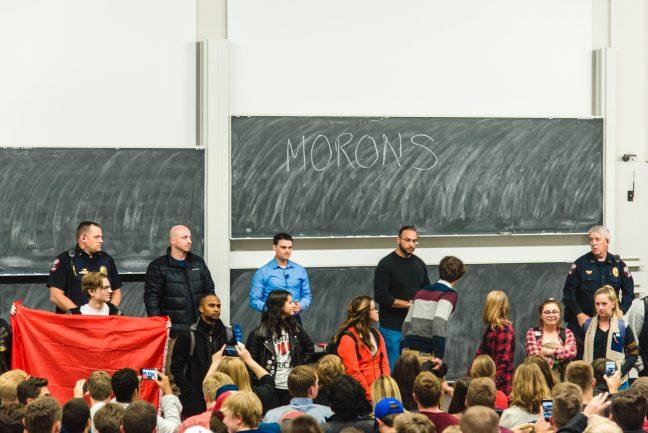On this campus, it’s common to see people who deliver controversial messages dive for the cover of free speech once their message is met with opposition.
It is hard to tell what they are seeking protection from. Real censorship means intimidation, but activists on campus seem far more interested in hearing themselves speak than silencing the opposition. Despite the warnings of conservative doomsday prophets, free speech is alive and well at our university.
But, as this past school year has shown, free speech is no guarantee of quality discourse. Those on both sides of the political spectrum continue to talk past each other, producing large quantities of hot air but few original ideas. Leftist activists claim to act in defense of justice and equality while conservatives insist they bring important and underrepresented views to campus.
Per usual, both think of themselves as embattled minorities trapped in a system that doesn’t represent them. And between the two of them, they are degrading discourse on campus. Such has been the case since I began my freshman year, and it remains the case as I prepare to graduate.
Here are a few unfortunate trends in speech on campus from this past year.
Self-righteousness
Echo chambers and cultural bubbles have turned too many students into committed ideologues, people so convinced they have found the truth they refuse to acknowledge any challenge to their ideology.
Near the end of the spring semester, the student group Young Americans for Freedom brought business magnate Steve Forbes to campus to give a talk entitled “How Capitalism Will Save Us.” Predictably, Forbes’ talk was met with leftist protests. The occasion afforded Madison’s left wing a rare opportunity to debate a titan of capitalism on their own turf.
Instead, the protesters opted to remain outside the lecture, chanting potty-mouthed slogans, harassing attendees of the event and congratulating themselves on a job well done. This kind of behavior reflects badly on the socialist cause and the university as a whole. This is supposed to be a place where ideas interact, clash and sharpen. Instead, we’ve settled for preaching sanctimonious sermons to our respective choirs.

Montana Leggett/The Badger Herald
Defensiveness
The quality of speech tends to suffer when groups assume the silent masses are in conspiracy against them. This kind of paranoia was on full display in the campus reaction to the formation of the Madison American Freedom Party earlier this year. The “group,” which actually consisted solely of hapless bigot and computer science major Daniel Dropik, provoked a large, vocal protest called “Take Back Our Campus.”
Among tens of thousands of students there are bound to be a few racists. Does that mean violent white supremacy is a major force on our campus? Not unless we legitimize it by giving it a platform, something “Take Back Our Campus” accomplished with flair. Despite their good intentions, the organizers of the protest accomplished little beyond feeding the victim complex of the hateful “alt-right.”
Provocation
During the fall semester, YAF brought notorious right-wing pundit Ben Shapiro to campus. As a thinker, Shapiro is occasionally interesting, but is mostly just an obnoxious reactionary.
Unfortunately, protesters took the bait and interrupted the lecture, leading to an embarrassing climax featuring a lot of shouting, a few obscene gestures and no productive debate. The protesters should have known better. But provocation is Shapiro’s specialty, and YAF surely did not expect a different outcome. There are plenty of conservative thinkers who bring ideas of value with them when giving a lecture. By choosing one whose strongest suit is controversy, YAF did a serious disservice to discourse on campus.

Katie Cooney/The Badger Herald
Obsession with identity
When individuals and groups suffer a mighty wrong, they have a right to claim justice. How far does that right carry, though? When people start to feel oppression is so central to their identity they perceive any challenge to their beliefs as a personal threat, the production of good ideas is sure to shut down.
The recent ASM deliberations over divestment brought out some discomfiting behavior from both camps. The multiethnic coalition in support and the Zionist contingent against both made the mistake of taking the other side’s arguments personally.
What began as an impassioned debate over the merits of divestment soon devolved into a battle over identity. That is the kind of argument no one ever wins, and that rarely produces any ideas of value.
Protestors, pick your battles: Forbes’ speech not worth your breath
Apathy
Yes, campus activism has its flaws. But it’s still refreshing to see people putting forth views on social issues on a campus where any topic outside of sports, drinking and Snapchats seems radical. Unfortunately, most of the campus community has no interest in politics. This is a shame. Undergraduates at UW are, in general, both bright and passionate. The debate could be much richer if more students joined in.
We will have to get over these obstacles if the university community is going to begin producing ideas of value. One obvious solution is more real debate.
This is not a new idea. But what a lot of activists on this campus fail to understand is debate is neither a compromise, weakness or luxury. It is intellectual combat where bad ideas are finished off, good ideas strengthened and new ideas formed. True, not every argument merits discussion. But on the majority of issues, both sides look timid when they choose to complain rather than engage.
We have the energy and compassion to create a red-hot intellectual environment at UW. Next year, maybe we’ll see Madison socialists matching wits against free market-loving millionaires. Maybe we’ll see conservative groups get over their inferiority complex and bring a speaker of substance to campus. Maybe we’ll see Black Lives Matter activists and Zionist Jews arguing with passion, without bringing in any question of whose lives matter and whose don’t. Maybe not.
But it wouldn’t hurt to try.
Wilder Deitz (wdeitz@gmail.com) is a senior majoring in social welfare and French.


